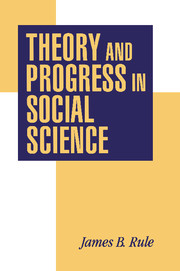PART II
Published online by Cambridge University Press: 05 November 2011
Summary
No one familiar with the history of our disciplines would deny that something very like fluctuating “taste” plays a vast role in our theoretical life. And as in art, literature, and other domains of pure expression, the rise and fall of such tastes often bear obvious links to social experience. Thus, if ethnomethodology fit the mind-set of certain thinkers in the 1960s and 1970s, one might conclude, no one should be surprised to find that different needs set the terms of theoretical work a generation or so later.
Some would insist that we should expect no more of theoretical social science than this – that is, the ability to capture the distinctive perceptions or sensibilities of a particular era or constituency. But doesn't such a position leave certain basic and utterly legitimate expectations unsatisfied? Are there indeed no valid criteria of analytical success or failure other than those set by the theories themselves?
The alternative – vastly more fruitful, by my lights – is to conceive of theoretical inquiry as an effort to fashion tools for responding to certain very broadly shared analytical needs, however abstractly conceived. These needs arise from the challenge of making sense of, and responding to, nearly universal perplexities of social life – dilemmas for action associated with such widespread conditions as social stratification, deviance, international conflict, poverty and prosperity, and so on.
Information
- Type
- Chapter
- Information
- Theory and Progress in Social Science , pp. 75 - 78Publisher: Cambridge University PressPrint publication year: 1997
